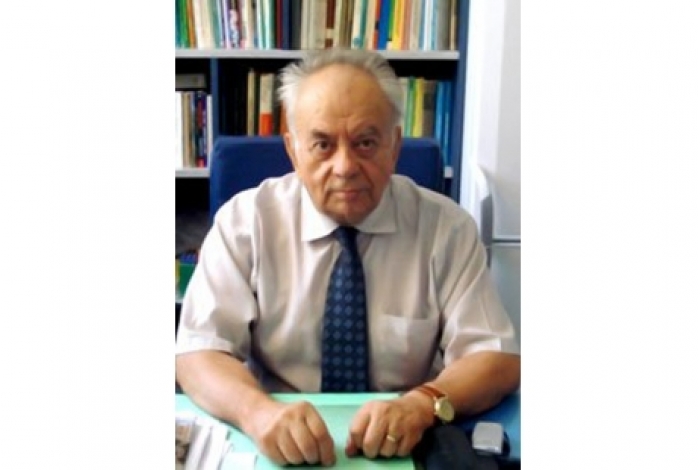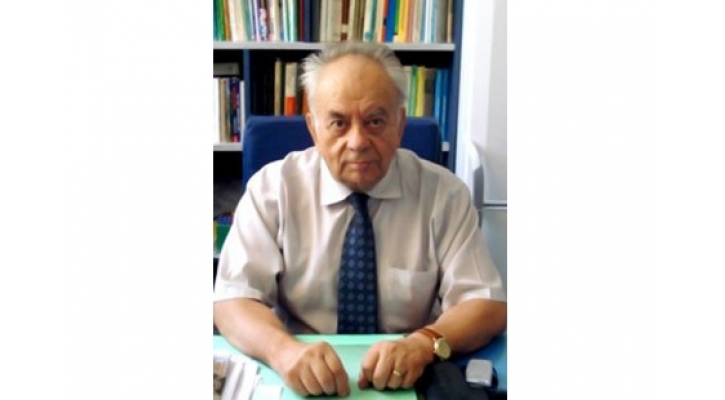Professor Dr. Constantin Milică reveals himself and his remarcable work
Constantin Milică is a Professor of Phytotherapy (the study of natural medicines) at the Universitatea Agronomică in Iaşi.

Professor Dr. Constantin Milică
On the 25th March I interviewed him, hoping to discover a bit more about his life and work. Despite some interesting translation complications, his responses revealed the profile of a fascinating person.
Following his passion
Forty years ago, Constantin Milică was a teacher of physiology and biochemistry in Bucharest. In his spare time he collected stamps and was something of an expert.
However, on moving to Iaşi he found the city to have much less of a stamp-collecting culture, so he switched his focus to his other great love – plants. The rest is almost history.
At first, Professor Milică continued in his role as a science teacher, but when he wasn’t in the classroom, he found himself applying to a number of international institutions for the funds to research traditional medicines.
He recalls contacting over 150 bodies in 50 different countries, but eventually ended up collaborating with the World Bank. With their medical funding he was able to travel the world collecting flower specimens, and devote all his energies to writing papers on his findings.
Today, Professor Milică is one of the most respected names in his field, and his clinic at the ‘Centre for Herbal Medicine’ has over 1000 products.
‘Aroma Iaşi’ produces treatments for almost every kind of human affliction: from respiratory to dermatological, cardiovascular to metabolic.
‘We even have remedies to keep you young!’ added the Professor, quite sincerely.
His inspiration into the medical plants world
I was eager to hear about the people who had inspired such his work.
He was quick to explain that all modern homeopaths had great respect for Ancient Greek physicians like Hippocrates, and considered the discoveries made thousands of years ago were still relevant to the practice today. At the same time he acknowledged that a few close colleagues had had a direct impact on his studies.
He spoke of Dr. Aristide Lazar, a close friend of his from Bucharest who is heavily involved with research into Romanian medical plants, as well as Craciun Florentin and Lazurca Dumitru who both work for the Bio-Medicinal company Plafar.
These people he remarked, inspired him to start his work, and constantly encourage him to continue with it.
He believes one of the most significant recent developments in his field is the attempts by natural medicine experts to address significant public health problems, notably cancers, smoking addiction and alcoholism. Successful research in this area would seriously enhance homeopathy’s credibility as a modern science.
Professor Milică pointed out that his colleagues had made serious headway: a solution known as ‘Complex 20’ has been used to treat breast cancer, and ‘Complex 16’ has been successful in combating liver diseases.
He himself is working intensively on a natural treatment for those addicted to nicotine, as he is concerned by the increasing number of women and young people who are being killed by smoking.
Modern medicine versus traditional medicine
When we turned to the subject of modern medicine, I was intrigued to learn that Professor Milică has no contempt for the drugs and theories of today, and indeed believes the modern and traditional schools of thought are compatible. He did point out the many flaws in the pharmacological discoveries of the 20th and 21st centuries though.
While he respected the benefits of the discovery of penicillins and antibiotics in the early 1900s, he was quick to point out the speed with which viruses are developing immunities to these prescriptions.
Similarly, while he saw the recognition of vitamins as crucial to a healthy lifestyle as a progressive development, he noted the huge number of new drugs that are trialed and subsequently withdrawn.
The Thalidomide scandal, he said, had proved to be a watershed moment in modern homeopathy. The disastrous consequences of the prescription – which was meant to alleviate morning sickness but led to babies being born with massive deformities – revived interest in traditional medicine across Europe.
Disillusioned with the uncertainty surrounding modern pharmaceuticals, which might either miraculously cure or demonstrate lethal side effects, many turned instead to natural and historic remedies, whose effects were less dramatic but proven safe by centuries of testing.
Professor Milică told me Romania is playing an important role in this reactionary movement, as its flowers are seen as some of the least polluted in the western world. Central European companies have noted this and buy thousands of tonnes of Romanian plant material every year.
But while he did not entirely dismiss the medical discoveries of recent years, he was critical of the medical education younger doctors are receiving, which he feels ignores almost all research before 1905. He expressed concern at the apparent disregard among young physicians for the writing of ancient ones. To neglect 5000 years worth of study he said, when looking at the patients of the present, is nothing short of ignorance. At the same time, Professor Milică was pleased to tell me that his understanding with older members of the medical profession has allowed him to build strong relationships with hospitals and pharmacies in the last 5 years.
‘More and more, experienced doctors refer patients straight to homeopathic clinics like mine’ he exclaimed proudly, and it is clear that there is a growing understanding, at least in Romania, between these contrasting practices.
Professor Milică promotes traditional medicine by his work and his own example
Another important aspect of Professor Milică’s work is the promotion of homeopathic ideas to the general public.
He has written 34 books (the most recent titled ‘Medical Flora of Romania’), and has published a total of 1081 papers, some of which he has presented in lectures on national television. He also regularly updates his website, (www.farmacia-verde.ro) which has been visited over two million times since it was set up ten years ago.
Perhaps most remarkably though, Professor Constantin Milică will be 84 before long, and yet shows little sign of slowing down. He is without doubt that traditional medicine has enabled him to live a longer and more productive life.
In fact, the big project on the Professor’s horizon is advocating his natural treatments as a way of living longer. He hopes to build on his book ‘Youth Without Death’, in which he makes reference to Methusula, the biblical character who allegedly lived 969 years. While he accepts that homeopathy will not yet enable us to survive for millennia, he deems use of natural medicine to be as important as good food and lack of stress in living to a ripe old age.
Towards the end of our session, he alleged that the chemicals in many modern products will often cure illness in the short term, but have detrimental effects on our long term health. The diminishing responsibility medical companies have for their products worries him immensely.
While the institutions that brought out defective drugs like Thalidomide were brought to justice in the 60s and 70s, today pharmaceutical companies avoid all liability for the adverse side effects their treatments might produce by claiming those who take them do so at their own risk, albeit in minute print.
When our interview had concluded, I felt not only privileged to have heard so much from a respected scientist, but truly motivated to take my own health all the more seriously. I can be sure that next time I enter a pharmacy, it certainly will be with a less blinkered mindset.
Text: Tom Lynas
Photo: www.farmacia-verde.ro





